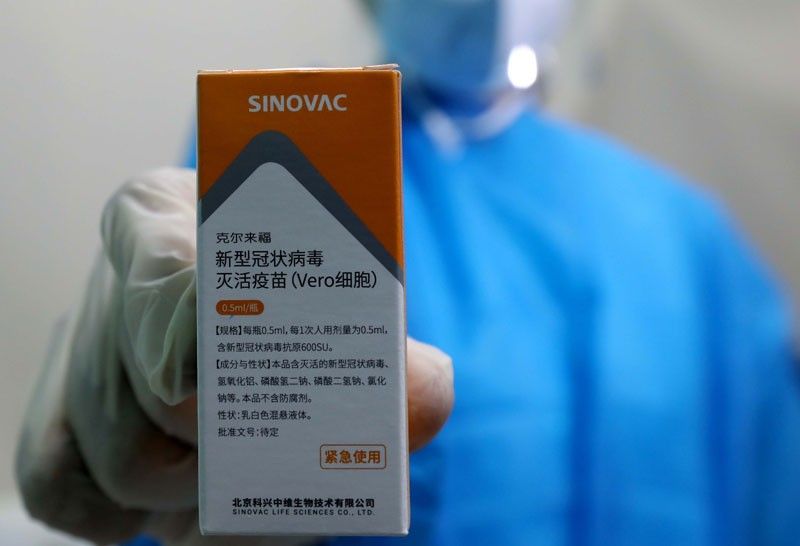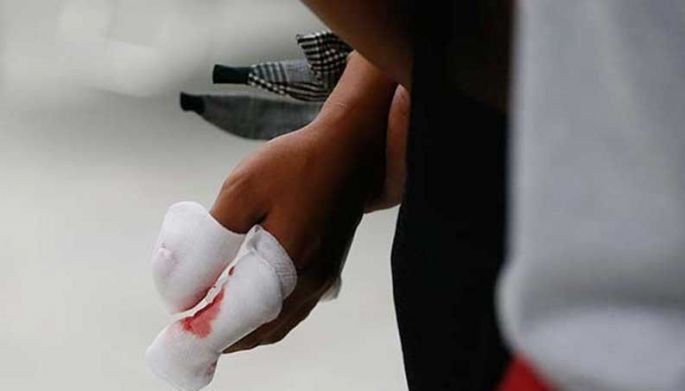Philippines to buy 1 million doses of Sinovac this March

MANILA, Philippines — One million more doses of COVID-19 vaccines developed by Sinovac of China will arrive within the month under a P700-million purchase deal that is set to boost the country’s initial stock of 600,000 doses of the same brand donated by Beijing.
Vaccine czar Carlito Galvez Jr. made the announcement yesterday as the government rolled out its vaccination program following the arrival on Sunday of 600,000 donated doses of Sinovac vaccines from China.
Galvez said CoronaVac of Sinovac and Russia’s Sputnik V are the only available vaccines due to heavy global demand.
“That is why we have procurement this coming March. We have one million from Sinovac,” Galvez said.
He said there is already a purchase order or PO for the acquisition of one million doses for P700 million.
“We have funds. We have P700 million funds,” Galvez pointed out. “Once we sign it, the one million doses will arrive this coming March in tranches. We saw 500,000 doses loaded onto an airplane. So, that would be in two tranches.”
Sinovac Biotech general manager Helen Yang told ANC they are still discussing details of the shipment with the Philippine government.
“The vaccine showed a good safety profile and strong efficacy results to prevent the severe cases and could lower down the burdens of the health care system,” Yang said.
“We sincerely hope that the Philippines will start to use the vaccine and help reboot the economy,” she added.
Galvez said the country’s supply agreements with other COVID-19 vaccine brands Moderna, Johnson and Johnson and Novavax were still pending.
Aside from Sinovac, other COVID-19 vaccine brands issued emergency use authorization by the Philippine FDA were Pfizer-BioNTech and AstraZeneca.
Galvez also said there is no definite date yet for arrival of 3.5 million doses of AstraZeneca vaccines due to global shortage of vaccines.
Based on previous announcement, AstraZeneca vaccines were supposed to arrive yesterday, under the COVAX Facility.
“There is no definite date yet. We have seen the reality on the ground. The global shortage of supply is acute,” Galvez said.
Galvez also said the first batch of the COVID-19 vaccines developed by Pfizer-BioNTech would likely be delivered by the second quarter. The delivery was initially announced to happen in mid-February.
After seeing surveys showing low public confidence in the Sinovac vaccine, the President – Galvez said – ordered him and other top officials to be inoculated with it.
At the Philippine General Hospital where he got inoculated with CoronaVac, Galvez said Filipinos would not be able to return to normal life and the economy would remain sluggish if they refuse to get immunized immediately and opt to wait for Western vaccines, which would come later in the year.
“We should not wait for the so-called best vaccine. There is no best vaccine because the best vaccines are those which are effective and efficient and come early,” Galvez said.
Supply shortage
Some 525,600 doses of AstraZeneca’s vaccine from the World Health Organization (WHO)-led COVAX facility were supposed to be delivered yesterday.
“We understand the challenge COVAX is facing because they are supplying the global community. What they have said is that the date of arrival is indefinite. Hopefully, by first quarter,” Galvez said, explaining the delay in the delivery of AstraZeneca vaccines.
Based on FDA evaluation, AstraZeneca has an efficacy rate of 70 percent after the first dose, a rate that will increase with the second dose after four to 12 weeks.
The Philippines has reported 576,352 COVID-19 cases overall, with 12,318 recorded deaths.
The government aims to inoculate 70 million of its 108 million people this year to achieve herd immunity and reopen an economy that in 2020 saw its worst contraction on record, due largely to tight restrictions on movement since mid-March.
Galvez insisted that the Philippines might not move forward unless everyone is immunized. “It is our moral obligation,” said Galvez.
At yesterday’s vaccination kick-off, PGH director Dr. Gerardo Legaspi was the first to be inoculated in public by a nurse, followed by Cabinet and health officials.
Manila Mayor Isko Moreno urged the public to trust whatever vaccine is available.
“Let’s get vaccinated, let’s save lives every day. We need to move on,” Moreno said, adding he would take his turn after a week.
The Department of Health (DOH) said it is looking at two weeks to finish administering the 600,000 doses of Sinovac vaccines.
“We are looking at two weeks for us to be able to roll it out properly and then we will have the next two weeks to monitor if there would still be ‘quick substitution list (QSL)’ that will be used,” DOH Undersecretary Maria Rosario Vergeire said.
Vergeire noted in a television interview that they want to check the QSL to determine if there are alternative vaccines that have not been utilized.
“So basically in two to three weeks, we will be able to utilize this because we already had a plan of rolling it out. Hospitals had been advised already and they are prepared and we started the rollout,” she added.
Senators expressed hopes the Duterte administration’s COVID-19 mass vaccination program would not sputter but gain ground faster than the virus could infect Filipinos, who should also be given more vaccine choices.
Honoring frontliners
Sen. Joel Villanueva said that while 1,000 shots were given yesterday, 100 million more Filipinos need to be inoculated.
“The journey of a hundred million shots begins with a single jab. But today’s events shouldn’t be seen as a mere symbolic start but as the start of something sustained, without letup and in numbers increasing by the week,” Villanueva said in a statement.
“For that is how we can meaningfully mark the first year of the lockdown on March 15, by demonstrating our will to end COVID’s reign of terror, one injection at a time,” he said.
He said a vaccination program done in earnest would also honor health frontliners who, along with the rest of the population, should be provided with more vaccine choices.
Senate President Pro Tempore Ralph Recto said the government should match frontliners’ heroism with vaccine offensive or “the first shot in our nation’s counterattack against the virus.”
That the first inoculation was given to PGH’s Legaspi “only underscores the moral responsibility of this government to support the continuing heroism of our frontliners with a vaccine offensive.”
He called Legaspi the “ground commander of the biggest COVID-19 hospital.”
It is also government’s duty to broaden the vaccine source or acquire “the best vaccines, the best human minds had developed,” he said.
“The vaccines have arrived as we are letting our people go out of their towns freely. Our vaccine arsenal should then grow as fast as we are allowing people to move around unrestricted. Without vaccines, the virus will be faster and smarter than us,” Recto said.
He said the newly signed COVID-19 Vaccination Program Act brings big business to the vaccination drive – not to profit, but to use their massive wealth in vaccinating as many people as fast as possible.
“With many sectors now enlisted in vaccine procurement and administration, the national government should lead from the front and not from the rear,” he said.
Sen. Grace Poe said the euphoria over the first shipment of the vaccines should be matched with a clear sight on a systematic rollout of the inoculation process.
“In making available the vaccine to health workers and other priority sectors, let us not forget our PUV drivers and other workers in the transportation sector who are key to our economic comeback,” Poe said.
“Drivers along with the other groups in the priority list – senior citizens, teachers, OFWs, essential staff, frontline workers, indigent population – need the protection against the virus most because of their situation as we embark on the road to the new normal,” Poe said.
Sen. Imee Marcos said the government must address immediately the high rate of hesitancy among Filipinos to get themselves vaccinated.
“First order of business is to convince Filipinos to get vaccinated. Let’s make the best use of this endless vaccine delay and persuade our people, for their health and the safety of their family and friends, that they should get inoculated as quickly as possible with any FDA-approved vaccine,” Marcos said.
“There is so much anxiety about side effects which are apparently rare and minimal – when the danger of infection is real and could be fatal. Any vaccination effort will fail with 46 percent to 47 percent of Filipinos skeptical or even against any COVID vaccines,” she said.
“Vaccine hesitancy can complicate the storage and delivery of vaccines, resulting in higher costs or outright wastage,” Marcos explained.
“A systematic registration process nationwide for willing vaccine recipients should already be in place if the bulk of vaccines does arrive in the third and fourth quarter of this year. This will guide the logistical requirements for transport, delivery and storage in every LGU from Luzon to Mindanao,” Marcos said.
She said “the public is also at a loss on what benefits they are entitled to in case of injury or death. To elicit a more positive response to vaccination, the government must clarify its indemnification policy and how the P500-million budget for this will be spent.” – Sheila Crisostomo, Cecille Suerte Felipe
- Latest
- Trending






























